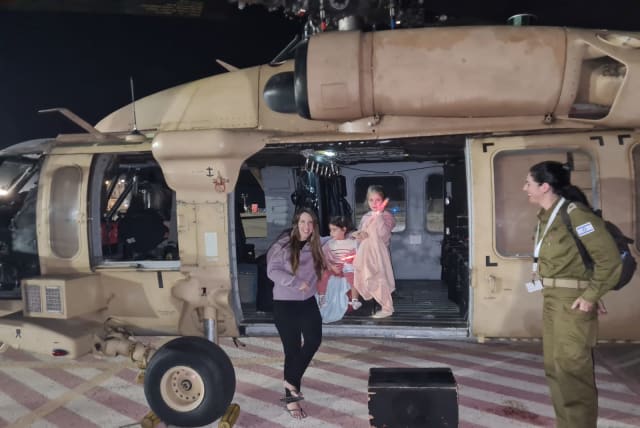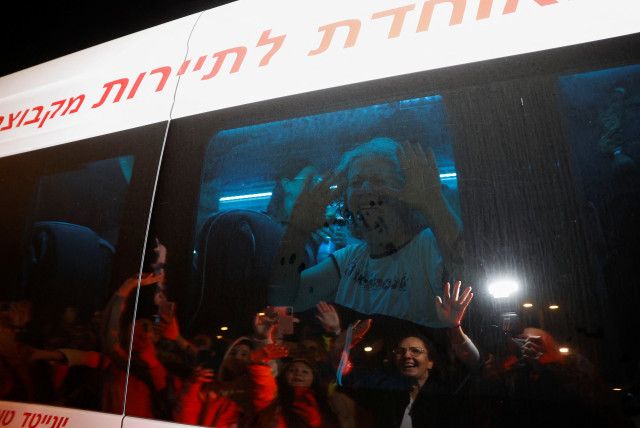Women held hostage by Hamas in Gaza kept in cages - report

Israeli hostages released by Hamas speak out about the state of their captivity in Gaza.
Women who were abducted from Israeli territory and held hostage by Hamas in Gaza were kept in cages, according to a report by Israeli media, citing a statement from a member of the Hostages and Missing Families Forum.
This claim is not the first of its kind: In the days immediately following the October 7 attacks, videos from Hamas's Telegram channel showed child hostages being kept in cages for the majority of their time in captivity.
נשים שהוחזקו בשבי חמאס שהו רוב הזמן בכלובים.כן, קראתם נכון, בכלובים.אל תתרגשו ממכתבים שחמאס הכריח אותן לכתוב.
— ישי כהן (@ishaycoen) November 27, 2023
Hamas distributed a letter on Monday allegedly written by Danielle Aloni, who was kidnapped alongside her 5-year-old daughter Emilia and held in captivity. In the letter, written in Hebrew and translated into Arabic, she reportedly thanked Hamas for the "extraordinary humanity" provided to her daughter, who "felt like a queen."
The letter also read, "I will forever be a prisoner of love because [Emilia] did not leave here with psychological trauma forever." The Aloni family has not confirmed this letter nor the statements made in it, though it has been widely distributed on social media by the Hamas terror organization.
This letter is one of many that hostages were forced to write, according to Israeli media reports.
Hamas shares a picture of the Israeli hostage’s letter thanking them for their good treatment.So, Hamas' plan was to kill the largest number of children, women, and elderly, then kidnap as many innocents as possible, and finally treat them well to present a positive image of… pic.twitter.com/zb7ou6tygg
— Ehab Hassan (@EhabH91) November 27, 2023
Survivors reported being provided with limited food while being held hostage, without clear reports of physical abuse or torture. Of the small rations they received – sometimes only rice and pita at best – the hostages were often left to cook the food for themselves and for the children held with them. They also said how their final two weeks had seen supplies running low.
Supplies running low
Merav Mor Munder, the cousin of Keren Munder who was released on Friday, told N12 "There were days when there were no supplies, so they only ate pita bread. They were not tortured, but there were days when they barely had any food, in the last few days they only ate very little rice."
She relates how one of the hostages, Hannah Katzir, who was also released, learned of her son’s murder on one of the few occasions they would be permitted to listen to Israeli radio. It was upon her own release that she found out that her husband had also been kidnapped and remains in Gaza.
Some of the hostages spoke of their worry about last-minute attempts by Hamas or Gazans – who had thrown stones at the vehicles taking them to Egypt – to attack them before they got home. "Until the last moment we weren't sure," a hostage said: "We thought they would lynch us on the way to Israel."
Sinwar visits hostages in tunnels
Hamas leader Yahya Sinwar, the man behind the planning of the October 7 massacre, spoke to Israeli hostages while they were held in Gaza, one Israeli who was released from captivity this week told her family, Israeli media reported on Monday evening.
Sinwar allegedly arrived in a tunnel where she and other hostages were being held, checked how they are, and told them in fluent Hebrew that they would not be harmed.
Israel's Channel 12 claims that this report was verified by her investigators in Israel's security systems.
Current concerns among Israel's defense and military analysts relate to Sinwar's plans for the rest of this war – namely, the exploitation of the humanitarian crisis among Palestinian civilians in order to advance Hamas's terror goals.
Neglect at the hands of the Red Cross
After Elma Avraham, 84, was returned to Israeli custody, she was immediately airlifted for emergency medical care. Her family claimed that she was “medically neglected” by international medical organizations that failed to provide her with the immediate medical treatment she required at the time.
“My mother did not deserve to be treated like this” stated Elma’s daughter, Tal Amano.
According to Amano, her mother was the victim of a “double betrayal that began on October 7 when she was kidnapped by Hamas, [that] continued with the failure of international organizations that were supposed to help her in the condition that she was in at the time of her release.”
Prior to her kidnapping on October 7, Elma was in relatively good health. However, she did have some underlying health issues that required medication.
“No one from the international organizations bothered to create a list with the medications she required,” her daughter continued.
“Clalit [an Israeli medical health fund] was the one who fought for us. It delivered the medication that Elma required to my brother in person. Yet, when my brother attempted to pass on the medication to a Red Cross representative at a meeting they held together, he was told no, they cannot do that.”
Elma’s family returned to the Red Cross building a few days later and were once again rejected.
“My mother should not have come back like this. What is the Red Cross there for? What is the UN Women organization for?” Tal demanded to know.
Dr. Nadav Davidovitch, who is currently treating Elma, said “We were in meetings with the Red Cross and asked them to make every effort to bring the medications to her, because some hostages are just dying. From a medical and nursing standpoint, what we witnessed is unlawful neglect.”
Keshet Neev and Jerusalem Post Staff contributed to this report.
The Jerusalem Post and OneFamily are working together to help support the victims of the Hamas massacre and the soldiers of Israel who have been drafted to ensure that it never happens again.
Become a partner in this project by donating to OneFamily >>
Jerusalem Post Store
`; document.getElementById("linkPremium").innerHTML = cont; var divWithLink = document.getElementById("premium-link"); if (divWithLink !== null && divWithLink !== 'undefined') { divWithLink.style.border = "solid 1px #cb0f3e"; divWithLink.style.textAlign = "center"; divWithLink.style.marginBottom = "15px"; divWithLink.style.marginTop = "15px"; divWithLink.style.width = "100%"; divWithLink.style.backgroundColor = "#122952"; divWithLink.style.color = "#ffffff"; divWithLink.style.lineHeight = "1.5"; } } (function (v, i) { });


